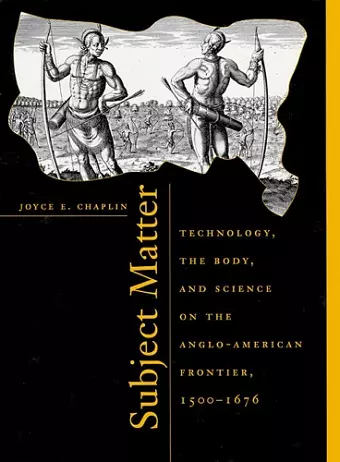Subject Matter
Technology, the Body, and Science on the Anglo-American Frontier, 1500-1676
Format:Paperback
Publisher:Harvard University Press
Published:30th Mar '03
Currently unavailable, and unfortunately no date known when it will be back

The range of sources that Chaplin employs is very impressive. Geographically, she ranges from the Arctic to South America. She is versed in the narratives of exploration, colonization, and European science. Subject Matter engages the material world and the cultural world and stresses complex and mutual influences. It is a cultural history, but the book is also much more. Read as an environmental history, the book is the most sophisticated demonstration of the centrality of gender to analysis of nature and the environment that I have yet seen. It is a book that I will be thinking about and recommending to others for quite some time. -- Richard White, Stanford University
By placing the history of science and medicine at the very center of the story of early English colonization, Chaplin shows how contemporary European theories of nature and science dramatically influenced relations between the English and Indians within the formation of the British Empire.
With this sweeping reinterpretation of early cultural encounters between the English and American natives, Joyce E. Chaplin thoroughly alters our historical view of the origins of English presumptions of racial superiority, and of the role science and technology played in shaping these notions. By placing the history of science and medicine at the very center of the story of early English colonization, Chaplin shows how contemporary European theories of nature and science dramatically influenced relations between the English and Indians within the formation of the British Empire.
In Chaplin's account of the earliest contacts, we find the English--impressed by the Indians' way with food, tools, and iron--inclined to consider Indians as partners in the conquest and control of nature. Only when it came to the Indians' bodies, so susceptible to disease, were the English confident in their superiority. Chaplin traces the way in which this tentative notion of racial inferiority hardened and expanded to include the Indians' once admirable mental and technical capacities. Here we see how the English, beginning from a sense of bodily superiority, moved little by little toward the idea of their mastery over nature, America, and the Indians--and how this progression is inextricably linked to the impetus and rationale for empire.
The range of sources that Chaplin employs is very impressive. Geographically, she ranges from the Arctic to South America. She is versed in the narratives of exploration, colonization, and European science. Subject Matter engages the material world and the cultural world and stresses complex and mutual influences. It is a cultural history, but the book is also much more. Read as an environmental history, the book is the most sophisticated demonstration of the centrality of gender to analysis of nature and the environment that I have yet seen. It is a book that I will be thinking about and recommending to others for quite some time. -- Richard White, Stanford University
In this wide-ranging and highly suggestive book, Joyce E. Chaplin, makes a stimulating contribution to scholarship on the origins of American ideas of racial difference. Subject Matter, compliments current work in several ways...Where most scholars, like Winthrop Jordan in his path-breaking White over Black, have focused mainly on Anglo-American ideas of African racial difference, here the author is primarily concerned with Anglo-American ideas of Amerindian difference...The significance of the book and the author's appointment cannot be underestimated. She has become the Perry Miller of academia's next generation, replacing his 'New England Mind' with her 'Anglo-American Body'...Like Mr. Miller's The New England Mind, Subject Matter is an impressively thought-provoking achievement destined to serve as a touchstone of debate for some time to come. The author's style is measured, her concerns moral, and her scholarship daring. -- Evan Haefeli * Washington Times *
With this sweeping reinterpretation of early cultural encounters between the English and American natives, Joyce E. Chaplin thoroughly alters our historical view of the origins of English presumptions of racial superiority, and of the role science and technology played in shaping these notions. * techdirections *
This book does well what few books manage to accomplish even crudely--taking a historical context that at first seems familiar and showing new and interesting complications, contradictions, and still-pending questions. It also develops a number of subthemes in unexpected but convincing ways, providing a truly fresh perspective. Among the several strands that Chaplin artfully interweaves are race, weaponry, adaptation, the physical environment, the nature of science, English ideas about the human body, dissimilarities with the Spanish national character, and a host of other themes...[This book] provides rich rewards and fascinating serendipity. -- D. B. Heath * Choice *
- Nominated for Albert J. Beveridge Award 2001
- Nominated for James A. Rawley Prize in Atlantic History 2001
- Nominated for John H. Dunning Prize 2001
- Nominated for Morris D. Forkosch Prize 2001
- Nominated for Pulitzer Prizes 2002
ISBN: 9780674011229
Dimensions: unknown
Weight: 599g
428 pages